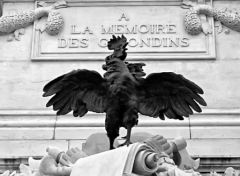Seriously. They do. There is something fantastic about bringing up a child in two languages, it is that you discover things about your own languages that you never really thought about.
When a child learns to speak, one of the first thing you do, is teach them the noises that animals make. I guess all parents have gone through this ordeal of making themselves ridiculous while imitating a dog, a cow or God knows what animal, instead of plainly saying "this is a dog", you'll go "this is a dog, wow wow".
Well, here comes the problem. As stated in this blogpost, German animals make different noises than English speaking ones. And to top it all, French ones say things differently as well. So how does a child make the difference? I mean, which are the true animal languages?
 Take the rooster for example. It goes Cocka doodle doo in English, Kikiriki in German, and Cocorico in French. Mind you, seeing that the rooster is one of the French national symbols (granted, due to a funny etymology history), I'm tempted to say that we (the French) know better what it really says[1] Same for the frog (we are the ones eating frog legs, after all), which goes ribbit in English, kwock in German and coââ - coââ in French. Frankly, the English speaking frogs are strange, and I am pretty sure they can't understand the French or German ones, which seem to speak neighbour languages.
Take the rooster for example. It goes Cocka doodle doo in English, Kikiriki in German, and Cocorico in French. Mind you, seeing that the rooster is one of the French national symbols (granted, due to a funny etymology history), I'm tempted to say that we (the French) know better what it really says[1] Same for the frog (we are the ones eating frog legs, after all), which goes ribbit in English, kwock in German and coââ - coââ in French. Frankly, the English speaking frogs are strange, and I am pretty sure they can't understand the French or German ones, which seem to speak neighbour languages.
All in all, I find it interesting that such things as onomatopea are so different from one language to another. You'd think that with a few quirks, due to existing sounds in one or the other languages, animal talk would be transcribed in approaching ways. After all, it is just a matter of listening and reproducing. But no, that's not the way it works. I'm wondering how our daughter will handle those differences. Maybe her rooster will say something like Cocoriki?
Notes
[1] Image to prove my point: Coq gaulois from the statue of the Girondins, Place des Quinconces in Bordeaux © Jean-Marie DAVID Dinkley, CC-BY-SA 3.0.

